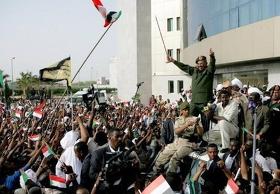Minneapolis, May 31: The full Minnesota National Guard was activated for the first time since World War Two after four nights of civil unrest that has spread to other U.S. cities following the death of George Floyd, a black man shown on video gasping for breath as a white Minneapolis policeman knelt on his neck.
Minnesota Governor Tim Walz said the deployment was necessary because outside agitators were using protests over Monday’s death of George Floyd to sow chaos and that he expected Saturday night’s demonstrations to be the fiercest so far.
From Minneapolis to several other major cities including New York, Atlanta and Washington, protesters clashed with police late on Friday in a rising tide of anger over the treatment of minorities by law enforcement.
“We are under assault,” Walz, a first-term governor elected from Minnesota’s Democratic-Farmer-Labor Party, told a briefing on Saturday. “Order needs to be restored. ... We will use our full strength of goodness and righteousness to make sure this ends.”
He said he believed a “tightly controlled” group of outsiders, including white supremacists and drug cartel members, were instigating some of the violence in Minnesota’s largest city, but he did not give specific evidence of this when asked by reporters.
As many as 80% of those arrested were from outside the state, Walz said. But detention records show just eight non-Minnesota residents have been booked into the Hennepin County Jail since Tuesday, and it was unclear whether all of them were arrested in connection with the Minneapolis unrest.
The Republican Trump administration suggested civil disturbances were being orchestrated from the political left.
“In many places, it appears the violence is planned, organized and driven by anarchic and left extremist groups - far-left extremist groups ... many of whom travel from outside the state to promote violence,” U.S. Attorney William Barr said in a statement.
In an extraordinary move, the Pentagon said it put military units on a four-hour alert to be ready if requested by Walz to help keep the peace.
Activists staged another round of protests on Saturday in at least a dozen major U.S. cities coast to coast, including Seattle, Los Angeles, Chicago, Cleveland, Dallas, Atlanta, New York and Atlanta.
In the nation’s capital, hundreds of demonstrators assembled near the Justice Department headquarters, then marched toward the U.S. Capitol, chanting, “Black lives matter,” and “I can’t breathe,” a rallying cry echoing Floyd’s dying words.
Many later ended up near the White House, where they faced off with shield-carrying police, some mounted on horseback.
The streets of Minneapolis were largely quiet during daylight on Saturday, though several National Guard armoured personnel carriers were seen rolling through town.
On Friday, in defiance of a newly imposed curfew, Minneapolis protesters took to the streets for a fourth night - albeit in smaller numbers than before - despite the announcement hours earlier of murder charges filed against Derek Chauvin, the policeman seen in video footage kneeling on Floyd’s neck.
Three other officers fired from the police department with Chauvin on Tuesday are also under criminal investigation in the case, prosecutors said.
The video of Floyd’s arrest - captured by an onlooker’s cellphone as he repeatedly groaned, “please, I can’t breathe” before becoming motionless - triggered an outpouring of rage that civil rights activists said has long simmered in Minneapolis and cities across the country over persistent racial bias in the U.S. criminal justice system.
‘PAINS ME SO MUCH’
The mood was sombre on Saturday in the Minneapolis neighbourhood of Lyndale, where dozens of people surveyed the damage while sweeping up broken glass and debris.
“It pains me so much,” said Luke Kallstrom, 27, a financial analyst, standing in the threshold of a fire-gutted post office. “This does not honour the man who was wrongfully taken away from us.”
Some of Friday’s most chaotic scenes were in the New York City borough of Brooklyn, where police armed with batons and pepper spray made more than 200 arrests in sometimes violent clashes. Several officers were injured, police said.
In Washington, President Donald Trump said on Saturday that if protesters who gathered the night before in Lafayette Square, across from the White House, had breached the fence, “they would have been greeted with the most vicious dogs, and most ominous weapons, I have ever seen.”
CHAOS IN ATLANTA
In Atlanta, Bernice King, the youngest daughter of slain civil rights icon Martin Luther King Jr., urged people to go home on Friday night after more than 1,000 protesters marched to the state capitol and blocked traffic on an interstate highway.
The demonstration turned violent at points. Fires burned near the CNN Center, the network’s headquarters, and windows were smashed at its lobby. Several vehicles were torched, including at least one police car.
Rapper Killer Mike, in an impassioned speech flanked by the city’s mayor and police chief, also implored angry residents to stay indoors and to mobilize to win at the ballot box.
“But it is not time to burn down your own home.”
Floyd, a Houston native who had worked security for nightclubs, was arrested on suspicion of trying to pass counterfeit money at a store to buy cigarettes on Monday evening. Police said he was unarmed. An employee who called for help had told a police dispatcher that the suspect appeared to be intoxicated.
In a striking coincidence, Floyd and Chauvin had both worked security at the same Latin nightclub in Minneapolis, though it was unlikely they ever interacted, former owner Maya Santamaria, who sold the El Nuevo Rodeo club in January, told Reuters.
Santamaria said Floyd worked inside the club on certain nights, supporting other staff with security. She said Chauvin, who worked outside the club as an off-duty cop for 16 years, had a reputation for roughing up customers, but she considered him responsible and a friend.






Comments
Add new comment